Darwin to host the Australia Wide Country Swimming Championships in October
Major national country swimming championships – the first of its kind – will make its debut in the NT in October.
Sport
Don't miss out on the headlines from Sport. Followed categories will be added to My News.
Major national swimming championships – the first of its kind – will be held in the Territory in October.
The Australia Wide Country Swimming Championships, set to be held October 1-4 at the redeveloped Parap Pool, will provide opportunities for regional athletes from across the country to compete on the national stage.
Swimming NT are expecting between 600 to 800 swimmers for the four-day event.
Targeting “national sub-elite” swimmers from regional Australia, the championships will attract competitors from the age of 12 to open adult, including both able bodied and para athletes.
More than 270 races and 110 medal events will be held with heats scheduled for the mornings and finals in the evening.
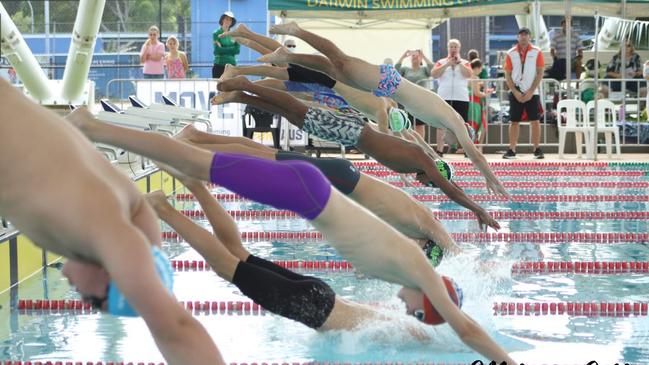
Before then, state country swimming championships will be held across the nation up until May, where athletes aim for national qualifying times and ultimately compete at the National Open and Age Swimming Championships — representing the top two per cent of swimmers across the nation.
However, swimmers who do not qualify for nationals will compete at the NT event in October.
A Swimming NT spokesman said the event was scheduled for the school holidays, allowing families of swimmers to attend and travel throughout the region.
“This is a fantastic opportunity for the Northern Territory to showcase its FINA standard competition facility which has also been used as an Olympic training venue in 2021,” the spokesman said.
“Competitors will travel from across Australia to compete with the average length of stay predicted to be at a minimum six nights.”
Long serving NT swimming coach acknowledged
THE Darwin Stingers are this week celebrating the work of the Territory’s longest serving active swim coach, Jac Stirrat, as part of International Women’s Day.
The grandmother of two began swim coaching in 1980, is a founding member of the Darwin Stingers and a life member of the Casuarina Swimming Club and over 40 years on enjoys it as much ever.
Stirrat has played a role in the development of some of the NT’s best swimmers including Gerda Williams, who was named NT Masters Sportsperson of the Year in 2003 and 2013.
Williams also achieved 28 rankings in the FINA Masters World Top Ten between 200 and 2020 and managed first placings in many FINA World Masters Championship events.
She has also coached Judith Green, winner of the SB6 Women’s 100m Breaststroke at the Sydney 2000 Paralympic Games, and multi-class swimmer Tahnee Afuhaamango, who has broken a large number of world records.
Stirrat herself has been swimming in Darwin since 1967 and is currently training for the Pan Pacific Masters Games to be held on the Gold Coast in November.
“Coaching has been an incredibly rewarding career,” Stirrat said.
“I have enjoyed seeing swimmers progress and achieve their goals. Hopefully, I have inspired them in some way, through their programs and encouragement.
“When I first started Masters swimming, I had to take my babies. I had a play pen on the side of the pool and a pram and got out to feed – that’s the way it was with the girls.
“I love the feeling of when fitness kicks in, it’s a freedom you’re almost at one with the water, and you can feel every single stroke.”
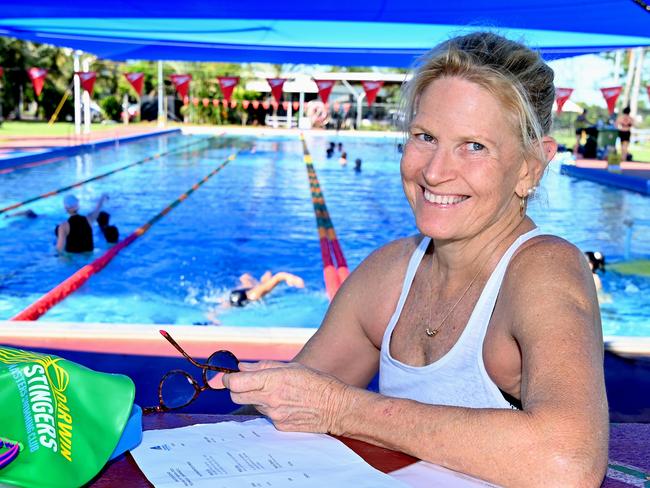
The Darwin Stingers was formed in 1989 and in 2021 had 178 members, making it one of the largest clubs in the country, with 75 percent of its swimmers being female.
Long-time technical official, Paul Carter said it was hugely important to have people like Stirrat involved in Territory swimming.
“Without people like Jac, you wouldn’t have swimming in the NT,” Carter said.
“It’s great today to celebrate women in sport and, particularly in the NT, women in swimming,
“A couple of years ago, Casuarina Swimming Club was struggling to find a coach and Jacinta stepped in.
“She has also been a committee member, president, technical officer and, after 55 years, is still a competitive swimmer. I don’t think there’s many people around Australia who can say that.”
‘That’s rubbish’: The day the wheels fell off for Scooter
He had quit competitive swimming, and in his own words, looked more like Jabba The Hutt than the Paralympic medal fancy he dreamt of being for more than a decade.
However, a chance meeting with a former coach helped Grant “Scooter” Patterson get back into the pool and eventually become one of the multi-medal stars of the 2021 Tokyo Paralympics.
Patterson, from Cairns, a guest speaker at Swimming Northern Territory’s All Abilities Gala Day in Darwin on Saturday, returns to the scene of the prize where he took one of his first serious dips into the professional world of swimming, way back in 2009 at the Arafura Games, claiming two gold medals.
His memories are a little sketchy other than it being an open pool and he went to a “crocodile farm” after his dual victories.
“That was a long time ago… I remember competing… it was definitely an experience for me,” Patterson offers vaguely, who was born with diastrophic dysplasia, a form of dwarfism.
What remains crystal clear however is ditching the togs back in 2002 for about five years after his head coach left for Melbourne.
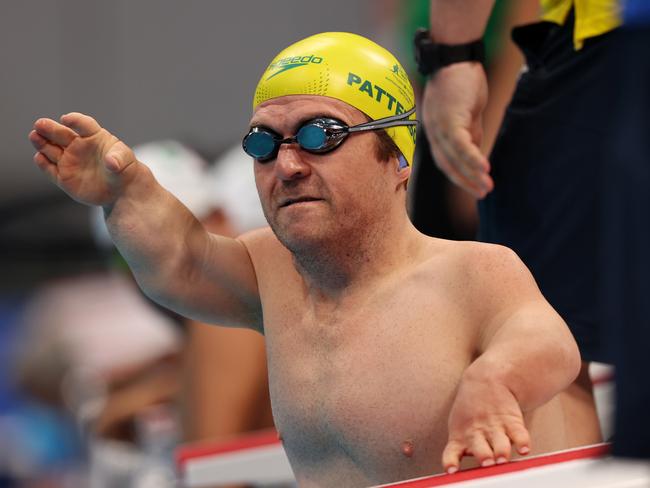
Lacking life experience, he mistakenly thought: “Nobody else could coach me because I’m different”.
“Which was incorrect, anyone can do it, they just have to put in the time,” he says.
Patterson admits he “got fat” during his high school years, which led him inevitably back to the water to shed a few kilos.
“It just wasn’t good for me, health wise,” he admits about his weight gain.
“When you’re the size of Jabba The Hutt, you can’t do anything.
“I soon realised I needed to lose weight.”
Then, he ran into an old assistant coach, Andrew “Herbie” Howards, who suggested he get back into competitive swimming.
Patterson was initially reluctant.
“I said no way… 5.30am starts, that’s rubbish,” he says.
“Two months later, I was back into serious training.”
Scooter would come to adore training, working so hard and pushing so many physical limits, he could barely gather another breath.
“Racing, I’m not a massive fan because you’ve always got a lot of pressure on you,” he says.
“When you’re racing, you have to eat like a mouse.”
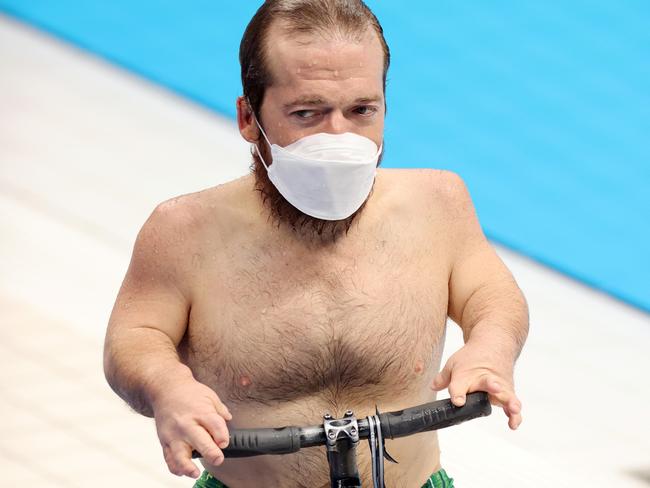
Disappointments and obstacles would inevitably come, however, like missing qualification for Beijing in 2008 by less than two seconds, then a medalless London in 2012.
But those tribulations, that scar tissue, only served to inspire Patterson to “work his butt off”.
“(London) gave me that drive to come back and hopefully win a Paralympic medal… it just took longer than expected,” he says.
However, a fork in the road appeared after he missed out on qualification for Rio four years later.
“I had two options, to throw in the towel and let the system beat me, or keep going,” he says.
When pressed on his issues with “the system”, Patterson is particularly candid.
“Well with Paralympic sport, it’ll never be fair because you’ve got all sorts of disabilities,” he says.
However, his parents helped shift his gaze towards more positive terrain, and he eventually realised he simply wasn’t fast enough.
“As much as I wanted to sit there and whinge and say: ‘That’s not fair, why is he there?’ all that crap… my parents redirected my focus,” he says.
“(They asked): ‘Do you want to be known as a whinger?’
“It’s up to you to go back to the pool and the gym and focus on what you’re good at.
“And whatever happens in the future, happens.”
Scooter learned to stop trying to master the intangibles, the uncontrollables.
“You’re better off focusing on yourself,” he says.
“As soon as we try and change the world, you’re wasting time.”
So, after 13 years of Paralympic swimming without feeling the dais under his feet, Scooter finally broke through with a bronze and a silver at Tokyo last year, in the 150m individual medley and 50m breaststroke respectively.
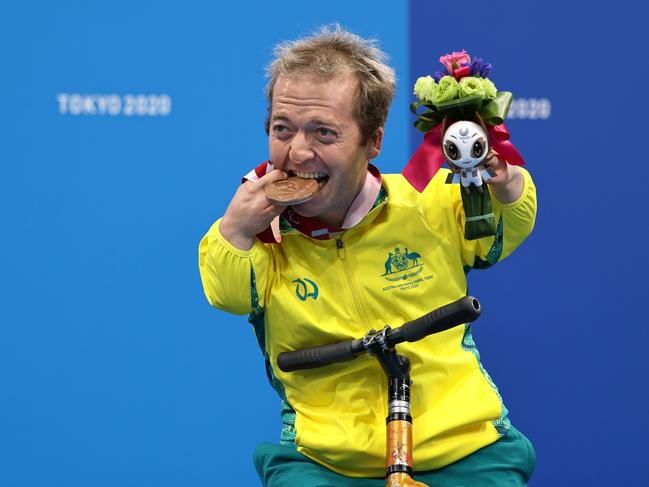
A good feeling?
“Bloody oath mate, it was a long wait,” he says.
“It was a long time in the making. It took me 13 years... to get that elusive medal.
“It was a very emotional evening for me (standing on the dais).”
Despite the success and white-hot media attention during and post-Tokyo, Scooter remains “the same well-grounded person from Cairns”.
He’s also made a ten-year plan, with Paris, Los Angeles and Brisbane Paralympics in his sights.
“I’ve got a lot ahead of me,” he says.
“Brisbane in 2032, then I’m out.”
The All Abilities Gala Day will be held at the Casuarina Swimming Pool from 10am on February 19.




